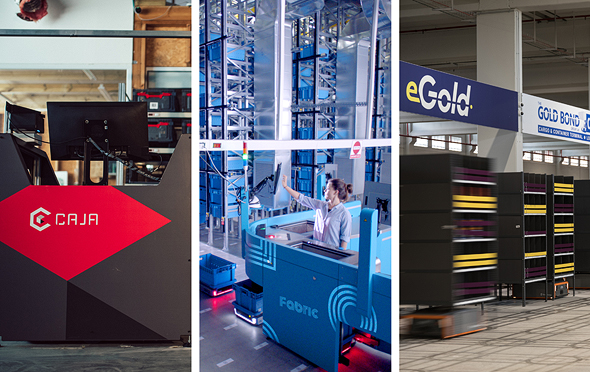Three companies are making strides in the automated fulfillment landscape, providing a glimpse into the future of retail
One of the first things that strike you when you enter eGold’s fulfillment center in the port city of Ashdod, is how quiet things are. The 20,000 square meter facility, that handles thousands of items a day, taking them from the container ship they arrived on and prepping them for delivery to customers’ homes is eerily silent. Where you would expect to hear the grumbling of engines, the whizzing and burring of conveyor belts, the shouting of instructions between workers, and the shrill warning of forklifts backing up, all you can hear is the hum of electric motors working in perfect sync.
The company’s state-of-the-art facility is one of the first of its kind in Israel and it is operated almost entirely by a robot, or rather an algorithm that manages the work of scores of individual robots. The facility, which was launched last February, is primarily used by solopreneurs and small enterprise e-tailers, enabling them to manage their whole logistics operation — import, storage, picking, sorting, and preparing for delivery — in one spot. The advantages: it’s fast, it makes almost no mistakes, and it provides a mix of human and machine quality assurance.

Israeli companies making strides in the automated fulfillment sector. Photo: PR
Following the flow of a single item through the entire process, showcases an astounding amount of different technologies at play, from a sorting system in which a mounted light pointer indicates to a human employee in which bin to place a scanned item depending on its weight and size, to the mini-forklift robots that maneuver around the center carrying shelves full of products of every kind to their predetermined destination for picking or longer-term storage, to the mindbogglingly complex Warehouse Management System (WMS) that knows where every item is at every moment, knows how to line up the shelves, bins, and robots so that they arrive where they’re needed at the precise time that they’re needed in the most efficient way possible.
“It’ll blow your mind, even more, when you realize that it is also a self-learning system that as soon as a new client is onboarded or a new type of product is introduced, adjusts itself in order to attain the highest efficiency and can anticipate things like shipment peaks and other fluctuations in activity,” said Yevgeniy Trakhtman, eGold’s business development manager.
Trakhtman said that the volume of items that the new center can handle is seven or eight times that of a traditional human-operated fulfillment center and with a fraction of the manpower and a micro fraction of the errors and mistakes. “Three centers like this could handle all of the e-commerce activity in Israel,” he noted.
Yotam Ben Ari, who manages eGold’s e-commerce operations said that it took the company more than six months to design and build the center, from making sure the storage floor was perfectly level with QR codes positioned on it precisely to help the robots navigate around the facility, to training the human pickers and packers to meet their strict quality control guidelines, to programming the WMS to operate in complete synchronization. “The next center we build won’t take quite as long because we have the expertise already. Nowadays, other companies that want to design similar solutions, come to us in order to learn how we did it,” he said.



Leave a Reply
You must be logged in to post a comment.